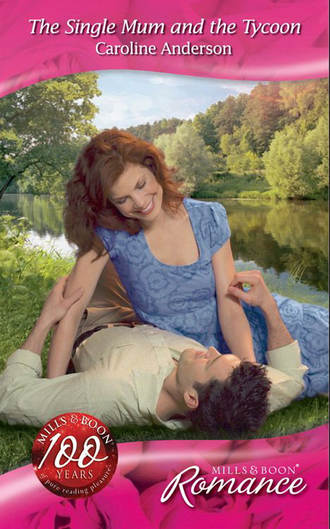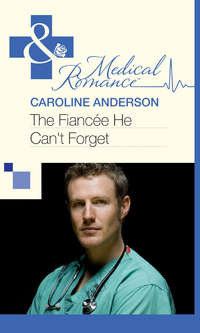
Полная версия
The Single Mum and the Tycoon
She straightened up, backing off with a wounded look in her eyes that made him feel sick, but he was too tired and jet-lagged and generally hacked off to deal with it now, so he let her go, and, as she closed the door, he heard her call Charlie and take him away.
There was no sign of them when he emerged from his shower room a few minutes later after a brief wash that of necessity included giving his stump some attention—no question of just taking off his clothes and getting into bed like a normal person, he thought heavily as he laid his folding crutches down beside the bed within reach.
Oh, well, at least it didn’t hurt any more—or not nearly as much. If only it had all been worth it, if there’d been any point in him having got himself into this mess, but his heroics hadn’t been enough, in the end, and tragedy had had its way. It had all been a complete and total waste.
And he wasn’t going to think about that now or he’d go stark, staring mad. Instead he’d think about Molly, and how she’d looked at him with those hurt, reproachful eyes when he’d bluntly dismissed her and all but told her to leave him alone.
Damn. He’d apologise tomorrow.
He got into bed and lay down in the bed with a sigh. He felt disappointed, as if he’d let himself down somehow, and his heart ached with—what? Regret?
Or just plain loneliness.
He rolled onto his front, jamming the pillow under the side of his head and stretching out his leg for the first time in what seemed like hours. Not that he’d been uncomfortable in the plane. Travelling business class was hardly roughing it, but it couldn’t prevent the turbulence and he was exhausted, his body clock disrupted by the time difference. But that didn’t mean he could sleep.
He shifted a little, and realised that the bed was, as Molly had said, very comfortable.
But not so comfortable that he could forget the look in her eyes as she’d backed away.
He thumped the pillow and turned his head the other way, and finally gave up and rolled on to his back, staring at the window. There was a chink in the curtains, and he could see the kitchen light on. She must be cooking their fish for supper, he thought, and felt a pang of regret that he’d bottled out. He stopped looking at it, turned his head away, tried not to think about what she and Charlie were doing and the fact that he could have been sitting with them and eating Bob’s sea bass instead of lying there alone.
Then he wondered what time she’d go to bed, and where she slept and, exhausted though he was, he thought again of that revealing peep of cleavage he’d seen when she’d first come round the corner and introduced herself, and felt the heat coil in his gut.
Stupid. Crazy. He was jealous of a leaf, for goodness’ sake!
Anyway, she wouldn’t want him. Not now she knew. He’d seen the pity in her eyes, seen the look she’d given his legs when he’d told her, the cringing embarrassment, the recoil.
He’d seen it before. Celia had looked at him like that, the first time she’d seen his leg after the accident.
At least Molly hadn’t been sick.
No. He wasn’t going to surrender to self-pity. It was a stupid, useless, destructive emotion and he had better things to do with his life than wallow in misery because the first woman in years to pique his interest was turned off by his disability.
God, he hated that word.
Hated all of it.
Suddenly he didn’t feel any older than Charlie, just a kid again, who should have been running around with skinny legs sticking out of his shorts, crabbing off the jetty without a care in the world.
Where had it all gone?
And with a flash of insight, he wondered how his father had felt, losing his son for the last eleven years. He’d never intended to emigrate, but that was how it had ended up. It hadn’t been intentional, and he’d missed everyone, but back home his father had missed him far more. He knew that. Georgie had left him in no doubt about it.
And now he had to go and tell him that the son he’d loved and missed for so long had come home disabled.
And he had to be his best man.
Hell.
He rolled on to his side, and saw an upstairs light on now. Molly’s?
Yes. He saw her reach up and close her curtains, and the silhouette of her firm, lush curves made him ache for something he would never have. Molly Blythe was strictly off limits, a beautiful young woman who was getting on with her life and who had better things to do than tangle with a man so physically and emotionally scarred he couldn’t even tell his own father about the mess his life was in.
And, just to underline the stupid, crazy nature of this thing that had happened to him, his toes—the toes he didn’t have any more—curled up in agonising cramp that made him whimper with the pain. Phantom limb pain? Nothing phantom about it.
He sat up and rubbed the stump, massaging it vigorously, trying to chase away the sensation, but it wouldn’t go. He rummaged in his bag for the metallic mesh sock that seemed to help, and pulled it on, lying back to wait for the relief that usually came.
There was no pattern to the pain. Nothing he could tackle in one straightforward way, nothing that made any sense. Acupuncture helped, but he was a long way from his acupuncturist, so he lay there, retreated into himself and, by slowing his breathing and focusing on the sound of the sea in his head, he went to a place where nothing could hurt him, nothing could reach him.
Not even his phantoms.
It was a cry that woke her.
No. Not a cry. More of a shout, mumbled and indistinct. She got up and went to the window and looked out, listening, and there it was again.
And it was coming from the cabin.
Her heart thumping, she grabbed her dressing gown and ran downstairs, flicking the button on the kettle on her way, and went down to the garden, the grass wet against her feet as she crossed to the cabin and tapped on the door.
‘David? Are you OK?’
He was mumbling something and, because she didn’t know if he was ill or if it was just a nightmare, she opened the door and tiptoed in. ‘David?’
Nothing, but she could see by the light through the gap in the curtains that he’d kicked the covers down to his knees and was twisting restlessly on the bed. He was naked except for a pair of snug jersey boxers, and there was a sheen on his skin, as if he was sweating. He was rambling, but as she stood there he said clearly, ‘No! Don’t let him die!’
He was dreaming—dreaming about something horrible and frightening, and without hesitating she crossed over to him and laid a hand firmly but gently against his shoulder. ‘David!’
He stiffened, and then after a second his eyes opened, he stared at her, and then with a ragged groan, he dragged the quilt back up over his chest and covered his face with his hands, drawing them slowly down over the skin and hauling in a great deep breath.
He let it out, then sat up and propped himself up against the headboard.
‘Sorry. Did I disturb you?’
‘You were dreaming.’
He gave a harsh sigh and stabbed his fingers through his hair. ‘Yeah. I sometimes yell a bit. Sorry.’
‘That’s OK. I did—for a while, after Robert died. The days were fine, but at night it would creep up on me. The dreams. Nightmares, really.’
She sat on the edge of the bed and looked at him. ‘Fancy a cup of tea?’
‘It’s the middle of the night. You want to go back to bed.’
‘Actually, I often get up for tea in the night,’ she admitted. ‘I don’t always sleep well, even now. It’s no trouble—if you want one.’
His smile was a flash of white in the darkness. ‘That would be really nice,’ he said softly. ‘I’ll get up.’
‘Isn’t that a lot of effort? I could bring it here. Save you struggling with the steps.’
He gave a grunt. ‘Just give me a minute,’ he said. ‘I’ll come over. I’ll be there before the kettle’s boiled.’
Hardly, she thought, but she didn’t say a word, just got up and went out, crossing the dew-soaked grass and running lightly up the steps to the veranda and then in through the back door. She saw the light come on in the cabin; then, as she was taking the teabags out of the mugs, he appeared at the top of the veranda steps, dressed in an open shirt, jeans and the shoes he’d had on the day before. And his leg, of course, which he’d had to put on, and was a fiddle.
She looked down at her feet, bare and wet with bits of new-mown grass stuck all over them, and wondered what it must be like never to walk barefoot, never to be able to wriggle your toes in the grass or the sand or the mud.
She’d die if she had to wear shoes all the time.
‘Shall we go in the sitting room? It’s chilly outside now,’ she said as he came in through the door.
‘You know what I really want to do?’ he said softly. ‘I want to sit on the sea wall and listen to the waves on the shingle.’
She eyed his bare chest through the open front of his shirt and tried not to get distracted. ‘In which case you might need a bit more on. It’s cold.’
‘I’ll be fine.’
‘I think you’ve probably forgotten about the sea breeze in Yoxburgh,’ she said with a smile, and picking up the car rugs she’d turned out of the cabin earlier, she wriggled her feet into her flipflops, picked up her tea and headed for the door. ‘Leave it open for Charlie,’ she said, and went out, leaving him to follow.
She was right, it was cold, but it was lovely, too.
Tranquil.
Still and calm, with nothing to break the silence but the suck of the sea in the pebbles and the occasional clink of a halliard.
She handed him a rug, and he slung it round his shoulders and dangled his legs over the edge of the sea wall and breathed in the salty, fishy, river mud smell of the estuary mouth that took him straight back to his childhood.
‘I love it here,’ he said with a contented sigh. ‘I’ve missed it.’
‘Here?’ she said incredulously. ‘Really? Compared to coral islands and tropical seas and stunning reefs and all that sunshine?’
‘It’s not all it’s cracked up to be. There’s something about being cold, about falling leaves and bright, sharp frost and the brilliant green shoots of spring—and the birds here are different. Beautiful, subtle birdsong. The birds in Queensland are all raucous and colourful and loud, really, and some of them like the cassowary are downright dangerous. Don’t get me wrong, they’re beautiful, but there’s nothing to beat a little brown wren or a chaffinch picking berries off a tree, and the dawn chorus here is so much more delicate.’
‘You wait till the seagulls get up,’ she said with a laugh. ‘They’re certainly raucous.’
He chuckled. ‘I’ll give you that. The gulls are always loud, wherever you are, but I love them.’
They fell silent, and for a long time she said nothing, but he could hear the cogs turning.
Then at last she spoke.
‘Who died?’ she asked softly.
He felt a shaft of dread. ‘Died?’
‘You said something in your sleep—it sounded like “Don’t let him die” but it was a bit mumbled.’
He nearly told her. Nearly talked about it, but he didn’t want to. Didn’t want to get the whole tragic tale out and rake over the embers all over again.
Not tonight.
‘I have no idea,’ he lied and, twisting round, he lifted his legs up on to the sea wall, got to his feet with what could never have been called grace and picked up his mug and blanket.
‘I’m turning in now. Thanks for the tea,’ he said and, without waiting for her, he headed back to his cabin, shutting the door firmly behind him.
CHAPTER THREE
‘GOOD morning.’
Molly tried for a smile. ‘Morning,’ she said, but her voice was strained, and David must have noticed because he gave her a keen look and sighed.
‘Molly, it was just a dream. Forget it.’
‘I can’t forget it. There we were, sitting on the wall listening to the sea and just talking and I had to go and put my foot in it—oh, damn, I didn’t mean that—’
He laughed. He actually laughed at her, to her horror and embarrassment, and then, before she could get her defences back in place, he took two strides across her kitchen and gathered her into his arms. ‘Molly, stop it,’ he murmured, and after a second or two, when it didn’t seem as if he was going to let go or do anything stupid, she slid her arms round him and hung on.
Lord, it felt good. She hadn’t held a man—not a young, healthy, vital man—for nearly seven years. And it felt good.
More than good. It felt right. She let her head settle down against his chest, so she could hear the steady, even beat of his heart, and gradually her own stopped thundering and she felt peace steal over her.
‘I’m sorry,’ she mumbled into his shirt, and his arms squeezed her and then let go, his big, warm hands on her shoulders easing her away so he could smile down at her.
‘No, I’m sorry, I shouldn’t have laughed at you. Come on, stop beating yourself up. I’m fine.’
‘Will you tell me? Who it was?’
His hands dropped abruptly. ‘One day,’ he said, stepping back. ‘Maybe.’ He looked around hopefully. ‘Right, where’s that mean breakfast you promised me, or were you lying?’ he asked, and her heart sank like a stone.
Конец ознакомительного фрагмента.
Текст предоставлен ООО «ЛитРес».
Прочитайте эту книгу целиком, купив полную легальную версию на ЛитРес.
Безопасно оплатить книгу можно банковской картой Visa, MasterCard, Maestro, со счета мобильного телефона, с платежного терминала, в салоне МТС или Связной, через PayPal, WebMoney, Яндекс.Деньги, QIWI Кошелек, бонусными картами или другим удобным Вам способом.









